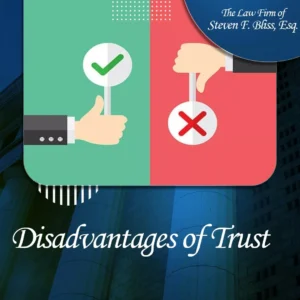Are There Pros and Cons of Revocable Living Trusts?
What are the disadvantages of a living trust?
Listen to this Article on:
The Pros and Cons of a Revocable Living Trust.
What Are the Pros and Cons of a Revocable Living Trust? Estate planning isn’t always easy. There can be many options for laying out how you want your estate divided. One option is a living trust. A living trust is established before a person passes away and spells out where they want their assets, investments, bank accounts, and personal property to go after they die.

With a revocable living trust, assets can be distributed to the grantor, and upon death, a “successor trustee” distributes the assets per the legal dictates of the trust. Probate can be avoided. Upon death, assets held in the revocable trust bypass probate, meaning the assets can pass to heirs without involving the courts, which can be time-consuming and expensive. A successor trustee generally takes over without court oversight. “Ancillary” probate in another state can also be avoided. Moving property into a revocable trust (and registering the deed to the trust) can avoid specific probate issues involving the out-of-state property. However, because you are still alive when you create a living trust, you can name yourself as the trustee and remain in control of all your assets. What’s more, a revocable living trust allows you to stay in control of your assets and, because it’s revocable, can be canceled or changed at any time.
As with any form of trust, there are both pros and cons of a revocable living trust. Determining if one is right for you should involve a discussion with a trusted and experienced estate planning attorney. The North and South Carolina estate planning lawyers at Mullen Holland & Cooper P.A. can review your situation, talk with you about your goals, and recommend an estate plan that satisfies your wishes.
Contact our office today for more information on whether a revocable living trust should be a part of your estate planning portfolio.
Please Help Us Spread The Word By Giving Us a 5 Star Rating on This Article
Free Initial Consultation with
Steven F. Bliss Esq.

★ ★ ★ ★ ★

Pros and Cons of Revocable Living Trusts
If you are having trouble deciding if a revocable living trust is suitable for your estate, consider some of these pros:
Avoiding Probate: Probate can be a lengthy and time-consuming legal process. A revocable living trust can help your loved ones or beneficiaries prevent it altogether. A living trust will allow you to name a successor trustee who can oversee the management of the trust after your passing without the need for court oversight.
Protections if You Become Incapacitated – A living trust can also protect your beneficiaries and assets if you become incapacitated. A successor trustee, selected by you, can assume control of the assets and administer them as outlined by the trust documents.
Privacy: A revocable living trust also offers some measure of privacy. Since the assets in the trust do not go through probate after death, there is no public record of the assets. This confidentiality can be valuable to families who value their privacy or who may have complex family dynamics.
Revocable living trusts aren’t without their disadvantages as well.
You may also want to take into consideration these drawbacks:
No Asset Protection: A revocable living trust does not protect assets from the reach of creditors.
Administrative Work is Needed – It takes time and effort to retitle all your assets from individual ownership over to a trust. All assets that are not formally transferred to the trust will have to go through probate. Transferring titled property to the trust can take time and effort on the front end.
Difficulty Refinancing Trust Property: A property held in a trust can sometimes be more challenging to refinance.
No Tax Benefits: Despite a common misconception, a living revocable trust does not shield assets from either income taxes or estate taxes.
An irrevocable trust, limited liability company, or a family-limited partnership could be better if asset protection is essential. It requires some administrative work. After creating a revocable trust, assets must be retitled into the trust’s name because assets not formally held in the trust still have to go through probate and won’t be under the management of a successor trustee in case of incapacity. But certain types of assets can still avoid probate, like retirement plans, insurance policies, annuities, and jointly held property, meaning a revocable trust may not always be needed.
Short & Simple:
Advantages and Disadvantages of a Living Trust
Advantages:
Avoids probate but not necessarily estate taxes
Administers property in different states with one document
Manages business and personal affairs during your life
Manages assets if you become incapacitated
Depending on state law, it may protect separate assets in case of divorce
Can pay medical and other bills and provide for scholarships
Distributes assets faster to beneficiaries
Provides privacy
Disadvantages:
Expensive to draft
Involves costs to update
Expenses can outweigh benefits
Not court-supervised
To protect assets, the trust must be funded with them
They need to be updated, and funding of the trust is forever ongoing.
